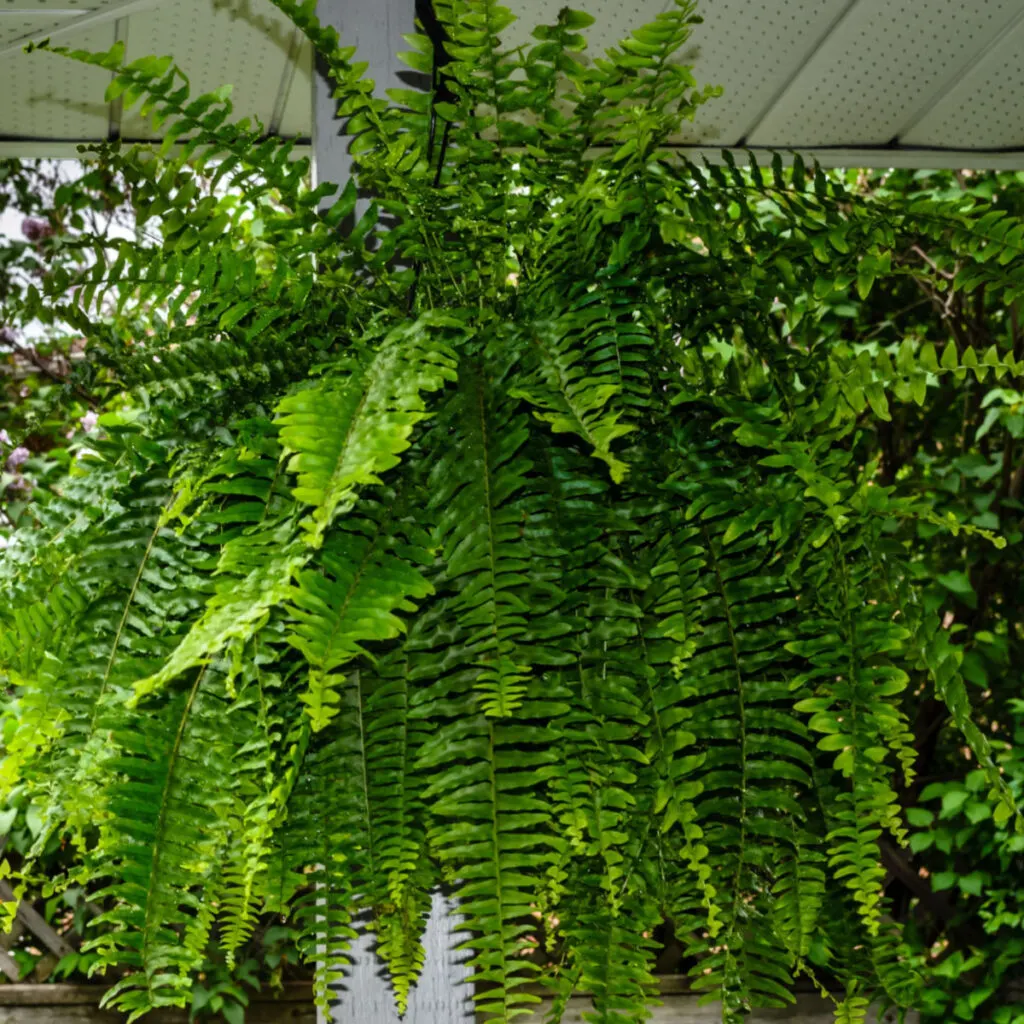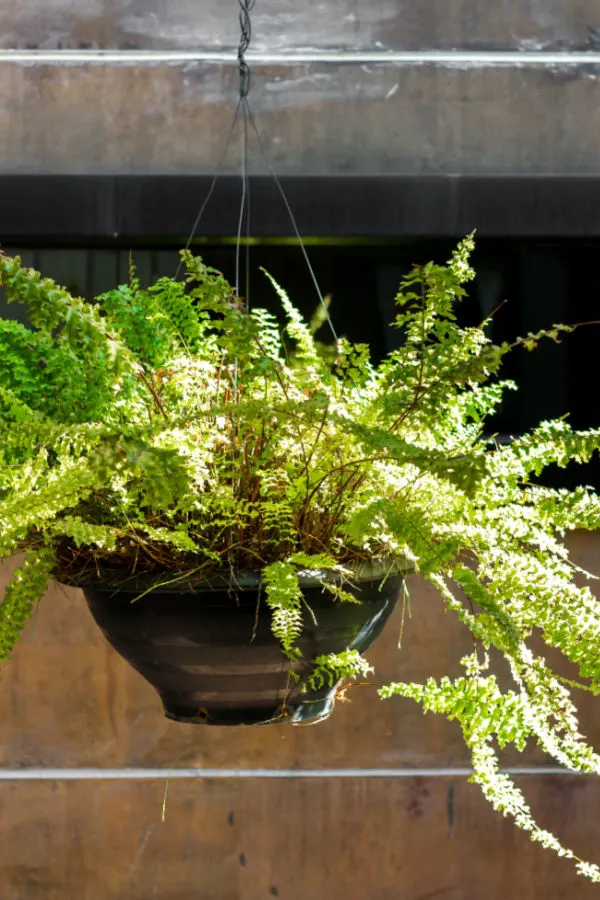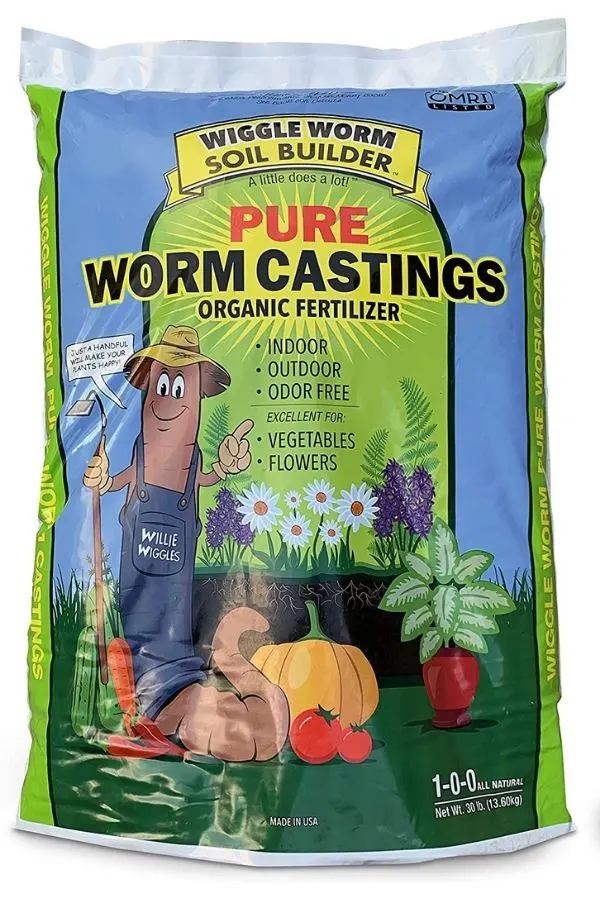Looking for a few simple tips for the best way to water, fertilize and care for your ferns to keep them healthy and strong all summer long?
Ferns are one of the most popular plants of all when it comes to hanging baskets and container plantings. In fact, it’s hard to go into a nursery, greenhouse or big box store in the spring and not find a huge display of ferns ready for sale.
It’s easy to see why they are so popular. Not only are they fairly low maintenance, they are especially great for those looking to add big interest to the shadier parts of their landscape. Although they may not have the flashy blooms of summer annuals, the bright green fronds of a fern can really lighten and brighten up dark porches, patios and shaded decks.

But for many gardeners, keeping their ferns healthy and vibrant all season long can be a challenge. By mid-summer, ferns that looked so incredible in the spring can often begin to look spindly and tattered. And quite often, their once bright green fronds begin to brown off as well.
Why Ferns Fail – How To Water And Fertilize Ferns For Big Success!
When ferns begin to fail, the problem can usually be traced to three simple and very fixable issues.
First and foremost, the biggest issue for ferns is location. Many ferns fail because they are simply placed in an area that gets too much sun. Ferns cannot handle direct sunlight. Especially if that sunlight is coming in the middle of the afternoon.
For optimum growth and beauty, ferns need to have indirect lighting. A few hours of early morning or late evening direct sunlight will work, but any more than that will burn the plant’s tender fronds.
Beyond location, there are two other critical factors for ferns growing in containers and baskets – watering and fertilizing. As you will see below, when it comes to watering, it’s all about providing consistent moisture to your plants – and doing so in a way that will not put their tender foliage in danger.

As for fertilizing, this is where most gardeners struggle when it comes to ferns. In general, ferns do not require heavy feedings to survive. In fact, if they get too much fertilizer or the wrong kind of fertilizer, it will actually damage the plants more than help them.
But as you will see below, contrary to popular belief, when growing in containers, ferns do need a little extra power in the form of fertilizer. But it’s what you use and how you use it that is the real secret to success.
With that in mind, here is a look at how to best water and fertilize your ferns to keep them beautiful all summer long!
Watering Ferns – How To Keep Ferns Beautiful All Summer
Proper watering is one of the biggest keys of all to keeping ferns in excellent shape. Ferns hail from tropical regions and damp, dark forests – both of which happen to have ample moisture and humidity.
Unlike many flowering annuals, the soil in a fern’s hanging basket or container needs to stay slightly damp at all times. Allowing it to dry out completely between waterings puts stress on the plant’s roots system. And when that occurs, the foliage up top suffers.
The real key is to keep the soil damp, but not wet. When the soil is too wet, the roots of a fern swell up. When that happens, they are unable to take in any moisture or nutrients at all. That, of course, will lead to the plant failing as well

Always check your fern’s soil before watering. You can do this with the tip of your finger down into the soil, or with an inexpensive soil testing meter. If the soil is soggy, water is not needed. But if it is slightly moist or more dry, lightly water to keep it that way.
It’s best to water ferns more often but with less water. This keeps the soil consistently damp without becoming too wet.
Finally, always try to water your ferns at the soil level. Avoid watering through the foliage. For one, ferns cannot absorb moisture through their fronds, so it does not help. But even more, overly wet leaves can leave the plant susceptible to mold, mildew and other disease. In addition, if sunlight happens to hit wet leaves, it can burn the foliage quite easily.
Fertilizing Ferns – How To Keep Ferns Beautiful All Summer
Although ferns can survive without a lot of soil from the energy, it doesn’t mean that a little extra power can’t help them perform even better. In fact, one of the biggest misconceptions when it comes to ferns is that they shouldn’t be fertilized.
Ferns growing in containers and hanging baskets have limited nutrients to pull from. Even though ferns don’t use a lot, by adding the power they love, it can help them produce stunning, dark green fronds. The key is to give them the right kind of power, in the right dose, and at the right time.
Ferns do not require a lot of nitrogen. In fact, too much will harm them. That means traditional all purpose fertilizers are not a good choice for ferns.
In addition, spent coffee grounds, which are excellent for most annual container plants, are not good either. Coffee grounds contain more nitrogen than anything else. Even worse, the grounds contain a substance that kills helpful bacteria on the soil that ferns need to have for plant development.
Worm Castings To The Rescue – Fertilizing Ferns
So what is the best fertilizer to use on your ferns? It’s none other than worm castings! Worm castings are the manure of earth worms. And they have the perfect balance of nutrients that will keep your ferns lush and green without overpowering them.
Best of all, worm castings are easy to use on ferns! Simply apply a quarter cup of castings once a month to the top of the soil, and then every time you water, the nutrients will soak down right into the roots to keep your ferns energized. Affiliate Product Link: 100% Worm Castings
It really is that easy – and you will be amazed at just how well your ferns respond to the easy-to-absorb nutrients from castings. Here is to watering and fertilizing your ferns to perfection this year – and to having them stay bright and beautiful all summer and fall long! Once winter rolls around, be sure to read our tips on Winter Fern Care – 3 Secrets To Keep Your Ferns Beautiful Indoors This Winter!
Follow Our Facebook Page For Even More Great Tips! Simple Garden Life Facebook Page
Simple Garden Life is a website dedicated to keeping gardening fun, simple and enjoyable! We publish two new articles each week along with a new garden podcast episode every two weeks. This article may contain affiliate links.

